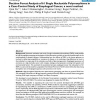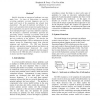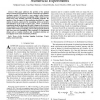443 search results - page 53 / 89 » Learning from a Population of Hypotheses |
BMCBI
2005
13 years 9 months ago
2005
Background: Systematic evaluation and study of single nucleotide polymorphisms (SNPs) made possible by high throughput genotyping technologies and bioinformatics promises to provi...
HICSS
2005
IEEE
14 years 3 months ago
2005
IEEE
1 Quickly detecting an unexpected pathogen can save many lives. In cases of bioterrorism or naturally occurring epidemics, accurate diagnoses may not be made until much of the popu...
TNN
2008
13 years 9 months ago
2008
This paper addresses the problem of the optimal design of numerical experiments for the construction of nonlinear surrogate models. We describe a new method, called learner disagre...
ATAL
2005
Springer
14 years 3 months ago
2005
Springer
Robust sequence prediction is an essential component of an intelligent agent acting in a dynamic world. We consider the case of near-future event prediction by an online learning ...
ICCV
2009
IEEE
15 years 2 months ago
2009
IEEE
Skeletonization algorithms typically decompose an object’s
silhouette into a set of symmetric parts, offering a
powerful representation for shape categorization. However,
havi...



